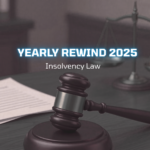“Doctrine of Necessity” can be read in accordance with the Code to revive a corporate debtor

The first order of objective of the Insolvency and Bankruptcy Code, 2016 (“Code”) is “resolution”.1 Keeping this in the background, recently, the National Company Law Appellate Tribunal (“NCLAT”) applied the “doctrine of necessity” to find a resolution to revive a corporate debtor. In this update, we will discuss the decision of the NCLAT in C. Sivasami v. A.R. Ramasubramania Raja & Anr.
Brief Facts
The company, Topknit Processing Mills Pvt. Ltd. (“Topknit”) was put into corporate insolvency resolution process (“CIRP”) on 21 November 2019. One of the promoters of Topknit, Mr. C. Sivasami (“Resolution Applicant”) submitted a resolution plan, which was approved by the NCLT, Chennai (“NCLT”) on 20 June 2022 subject to the condition that the Resolution Applicant shall deposit a sum of INR 10,11,00,000 (Indian Rupees Ten Crore and Eleven Thousand) (“Resolution Plan”).
Pursuant to this, the Resolution Applicant deposited an amount of INR 1,03,25,000 (Indian Rupees One Crore Three Lakhs and Twenty-Five Thousand) along with a security deposit. However, the Resolution Applicant could not deposit the balance amount due under the Resolution Plan. Owing to the non-compliance, the liquidator of Topkinit (“Liquidator”) filed an application for liquidation of Topknit in the NCLT. During this time, the Resolution Applicant undertook to deposit 1,00,00,000 (Indian Rupees One Crore) on or before 30 June 2023 and balance amount by 15 July 2023.
Despite the said undertaking filed by the Resolution Applicant in the NCLT, he could not honor the same. Accordingly, the NCLT passed an order for liquidation of Topknit on 26 July 2023 (“Liquidation Order”). Meanwhile, Resolution Applicant approached the NCLT stating that he was able to mobilize the funds and prayed to allow him to deposit the balance amount of INR 9,37,50,000 (Indian Rupees Nine Crore Thirty-Seven Lakhs Fifty Thousand) (“Balance Amount”). However, the NCLT rejected the same on 10 May 2024. Aggrieved by this, the Resolution Applicant has filed the present appeal.
NCLAT’s Ruling
The NCLAT considered 3 aspects while deciding the present appeal in favour of the Resolution Applicant:
- No objection by the Liquidator and Topknit
The Liquidator and Topknit expressed that they had no objection to the Resolution Applicant’s appeal and that he may be allowed to deposit the Balance Amount. The Liquidator informed that even after one year of the Liquidation Order, there are no potential buyers of Topknit.
- Liquidation Order had attained finality
It was observed by the NCLAT that the Liquidation Order was not challenged by Resolution Applicant and therefore, the order attained finality. Accordingly, it may not be correct for the Resolution Applicant to file the present appeal praying to: (i) put hold on the liquidation of Topknit and (ii) stay the operation of the Liquidation Order.
- Doctrine of Necessity
Despite the observation that the Resolution Applicant could not have prayed to stop the liquidation / Liquidation Order of Topknit, the NCLAT placed reliance on the “doctrine of necessity” to allow his appeal. The NCLAT observed that under the Code, the NCLT and NCLAT have powers to apply such a doctrine for meeting out inevitable circumstances and objectives of the Code. In the present case, no other resolution plan was submitted at the time. Moreover, despite being in liquidation for one year, there are no potential buyers for Topknit. Accordingly, the NCLAT observed that the ingredients of doctrine of necessity have squarely been met and a last opportunity must be provided to the Resolution Applicant to deposit the Balance Amount. The NCLAT observed that this would allow the resolution and revival of Topknit and would meet the objectives of CIRP proceedings.
The information contained in this document is not legal advice or legal opinion. The contents recorded in the said document are for informational purposes only and should not be used for commercial purposes. Acuity Law LLP disclaims all liability to any person for any loss or damage caused by errors or omissions, whether arising from negligence, accident, or any other cause.
- Binani Industries Ltd. v. Bank of Baroda & Anr. (NCLAT) ↩︎



